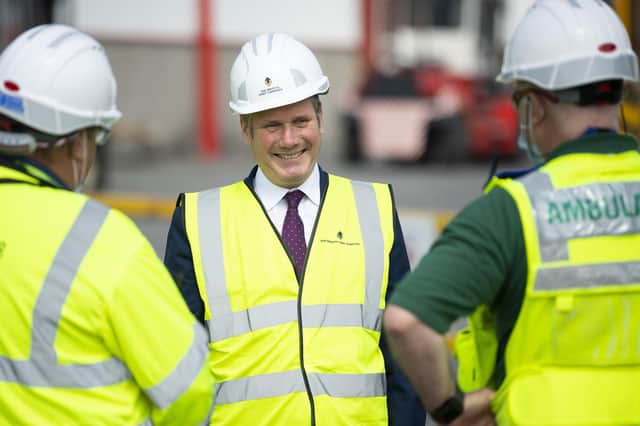Labour needs to stop parroting Tories on immigration, law and order, and retro-patriotism and persuade voters to back progressive policies – Joyce McMillan


How seriously voters will take Dominic Cummings’s evidence to the Commons Health and Social Care Committee remains to be seen; his own credibility is certainly severely damaged, given his key role in the events of the past five years.
Amid all the sound and fury, though, there is relatively little mention of the massive elephant in the room of current UK and English politics; and that is the persistent level of public support for a government that is both morally questionable on almost all fronts, and also – if Cummings and others are to be believed – often dangerously incompetent.
Advertisement
Hide AdAdvertisement
Hide AdTwo weeks ago, one poll gave the Conservatives a 15-point poll lead over Labour; and the current Politico poll of polls gives the Conservatives an 11-point advantage, despite a brief period last winter when the two parties seemed neck and neck.
It could not be more obvious, in other words, that whatever Labour is doing to oppose Boris Johnson and his government simply is not working.
The shift in leadership from Jeremy Corbyn to Keir Starmer seems, for many voters, only to have drawn attention to the continuing sharp divisions in a party which seems uncertain whether it wants to offer radical change, or merely a kind of Toryism lite.
Bafflement about what Labour stands for is widespread; and it is striking that its major electoral successes, on May 6, came in areas such as London, Wales and Manchester where people have current experience of a Labour administration – something most of the UK has lacked, now, for more than a decade.
Nor is Labour’s failing opposition to the Tories irrelevant to the political situation in Scotland, despite the party’s recent lacklustre performance.
If the centre of gravity of Scottish politics is somewhere on the social-democratic centre left, then Labour’s real and perceived failure to defend those values vigorously enough, at UK level and internationally, has formed the essential backdrop to every shift in Scottish politics, over the last 15 years; and if the UK does disintegrate over the next decade, Labour’s failure successfully to oppose Boris Johnson’s toxic form of Brexit nationalism will be among the primary causes of that disintegration.
Yet faced with this crisis, both recent Labour leaderships have seemed pretty much at sea. The Corbyn-McDonnell manifesto of 2019 represented a decent attempt to sketch how massive government interventions would be necessary to achieve a green transition in the UK economy; but it was profoundly uninterested both in the damage done by Brexit, which now needs urgent renegotiation and repair, and in the dynamics of the UK’s constitutional development as a multinational state.
The Starmer leadership, by contrast, seems transfixed by the spectacle of northern working-class voters switching their allegiance to the Tories, and so desperate to win them back that it lacks all interest in building new progressive alliances.
Advertisement
Hide AdAdvertisement
Hide AdThat Labour needs to continue to represent ordinary working people goes without saying. There is, though, a world of difference between representing the real needs of working people, and simply parroting back to them the reactionary non-solutions injected into the UK’s political mainstream by decades of right-wing media headlines.
At the core of Labour’s current failure lies the big truth that the party can never out-Tory the Tories on issues like immigration, law and order, and Union Jack retro-patriotism; and their only hope of future success is to reject these reactionary terms of debate, and to seek to shift the UK’s public conversation onto more progressive ground, by sheer force of energy and argument.
Of course, after a quarter-century of deference to a right-wing agenda, Labour is terrified of taking any such step.
Yet if Labour were to start thinking for itself about the future of Britain – and to stop adopting Tory tropes and attitudes on the grounds of their apparent popularity with focus groups and others – huge vistas of possibility open up: for a genuine debate about how to protect both public services and the livelihoods of ordinary people in a time of massive economic upheaval, about how to right the evident damage of Brexit by negotiating a rapid return to the single market, and about how to build a new alliance with other social democratic forces across these islands, including the SNP, in promoting both progressive social and environmental policies, and a constitutional future that offers all four nations guaranteed autonomy and respect, while encouraging constructive co-operation.
Of course, Labour could adopt all of these policies and still fail, against the thundering reactionary nonsense of the Tories and their wealthy supporters. The truth about Labour, though, is that it is a bold standard-bearer for a progressive and transformative future on these islands, or it is nothing. It needs new thinkers, new allies, a robust social democratic ideology that directly challenges Tory assumptions, and the courage to offer voters a new agenda, rather than a series of limp, reactive responses to the current one.
And if the Labour Party at UK level is not prepared at least to attempt that transformation, at this low point in its fortunes, then it might as well recognise that its time is over; and that however progressive politics is reborn, in England and across what is now the UK, it will not be under the banner of Labour, which once represented that cause so powerfully, and knew how to transform the lives of millions, through the sheer force of electoral politics.
A message from the Editor:
Thank you for reading this article. We're more reliant on your support than ever as the shift in consumer habits brought about by coronavirus impacts our advertisers.
If you haven't already, please consider supporting our trusted, fact-checked journalism by taking out a digital subscription.
Comments
Want to join the conversation? Please or to comment on this article.
